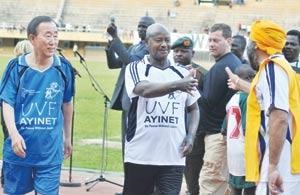Football – the ladder for Ugandan politicians

Ugandan President Yoweri Museveni and UN Secretary General Ban Ki-moon inspect team-mates ahead of a Peace match for war victims in Nor
24.06.2010
By Muhammad DhakabaIn Africa, football and politics are inseparable – different regimes have exploited this beautiful game to achieve their personal agendas. Many African leaders have on different occasions supported or organized football matches to act as a mechanism of reconciling and appeasing their people, most of whom are victims of iron-handed or bad leadership.
Football and politics in Uganda
Whereas many people are divided along political lines in Uganda, football has played a very important role in mending their differences. And many political leaders or aspirants regularly organize football tournaments as a means of delivering their agendas.
Godfrey Kwizera, a veteran Football Association administrator in Uganda asserts that the practice of exploiting football to achieve a political platform is as old as the country Uganda itself.
“Politics and football go hand in hand – that’s why the first president of this country – (the late Edward Muteesa II, who was also the king of the Buganda kingdom) always played football as a way of advocating for peace and stability.
“Under this arrangement (of spreading the political gospel), he managed to convince the people of different ethnical backgrounds and their leaders to unite and subscribe to one state as opposed to their traditional kingdoms,” said Kwizera during an interview.
Idi Amin’s love for football/Football to celebrate independence
As evidence that football plays an integral part in society, the coordinators of Uganda’s first independence celebrations in 1962, organised a match between Uganda and Zaire at Nakivubo Stadium in the heart of Kampala City, to celebrate the attainment of self-governance from Great Britain.
Subsequent governments, save for the current regime, have since loosely approved football as a national symbol for both entertainment and political causes, according to Moses Mugalu , a sports analyst based in Kampala.
“Sports and football in particular was at its best during the 1970s when the late president Idi Amin Dada was in power – this was largely so because Amin naturally liked sports.
“So, when the rest of the world tried to cut him off due to his iron-handed approach on political issues, he sought refuge in football – spending resources and time in encouraging its development through well-organised structures like the army, prisons, police as well as other governmental bodies,” recalls Shaban Terehano – a businessman and football fan.
Football should be on the list of priorities
Despite Amin’s love for football, Uganda only managed a runner-up finish during the Ghana 1978 Africa Nations’ Cup finals. The Cranes – as the national team is fondly called – lost 0-2 to the hosts, and another appearance has since eluded this pearl of African nation. Two earlier appearances at this African coveted tournament had little impact, while qualifying for a World Cup event is a dream that could take ages to be realised.
“The unfortunate thing is that football has for long been used by politicians as a stepping stone. Why shouldn’t they come up with a law binding government to directly support football developmental programmes – just like it is in other sectors?” wondered Kwizera, insisting that once elected the FA president, he would lobby for football to be included on the list priority.
The African World Cup aspect
Many Ugandans believe that the staging of a World Cup event on the African continent is likely to stimulate politicians and policy-makers to regard football as a side-income, and not merely an entertainment in society.
However, President Yoweri Museveni (the Ugandan head of state) has on different occasions scorned the sport, despite his continued participation in exhibition matches – which is an avenue of disseminating his message to the people. The president has occasionally expressed his disapproval of the sport, though he encourages the youth to embrace it as a way of keeping mental and physical fitness.
“This government should ride on the tournament in South Africa. The event is away in South Africa, but already, there are signs of positive effects - more people are buying television sets, bars are registering more customers than in the past months, and tourists are visiting different part of Uganda – which translates into increment in taxes,” says Henry Mugisha – a manager at Atelakani Enterprises Ltd, along Wilson Road.
|
Testimony: What football relations can do? In 1971, as the Ugandan political ground become unlevelled, a story is told of a great footballer – the late Denis Obua – who was working at the Entebbe Police Airbase at the time Amin took over power via a coup d’etat. |





